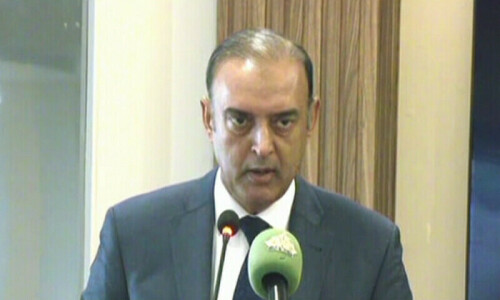
CHICAGO: The Chicago trial of a Pakistani man accused of helping to plot the deadly Mumbai attacks opens next week amid a diplomatic crisis which could worsen if evidence of Pakistan's involvement is revealed.
Pakistan is already trying to deflect mounting suspicion of official complicity with terrorism in the wake of the May 2 US raid which killed Osama bin Laden in an urban compound only 55 kilometers (35 miles) from Islamabad.
The world's most wanted terrorist had been living in the Abbottabad compound for five years, his wife told investigators.
The upcoming Chicago trial could lend credence to suspicions that Pakistan's spy agency, the Inter-Services Intelligence (ISI), was involved in the November 2008 Mumbai attacks in which 166 people died.
“This is going to be yet another brick in this very large wall of suspicion that we have about Pakistan,” said Khalil Marrar, a political science professor at DePaul University who has been following the case.
“It's going to be a significant trial. I don't know if it's going to be as informative about the role of Pakistan as it could be.” Prosecutors are expected to object to any testimony which would implicate the ISI and focus the trial on the involvement of Tahawwur Hussain Rana, a Chicago businessman with dual Pakistani-Canadian citizenship.
Rana is accused of acting as a messenger and providing a cover for David Coleman Headley, who has pleaded guilty to spending months scouting terrorism targets in India on behalf of the banned Pakistani group Lashkar-e-Taiba (LeT).
Rana insisted after his October 2009 arrest that he is a pacifist who was “duped” into letting his old friend from military school use his immigration services company as a cover.
But in pre-trial motions, his lawyers proposed defending Rana's actions by arguing that he believed Headley was working on behalf of the ISI, not terrorists.
Headley testified to a grand jury that he told Rana about “my meetings with Sajid and others in Lashkar” and “how I had been asked to perform espionage work for ISI,” court records show.
“I explained to him that the immigration office would provide a cover story for why I was in Mumbai,” Headley said, according to court records.
Judge Harry Leinenweber ruled against this proposed defense on legal grounds - Rana is being prosecuted for his actions in the United States and even if Headley were acting on behalf of the ISI neither he nor Rana would be exempt from US laws.
However, evidence of Pakistan's involvement could still surface at the trial which begins with jury selection Monday and will provide a window into terrorist operations.
Pakistan denies any official involvement in the bloody 60-hour siege but acknowledged in 2009 that it was plotted, at least partly, on Pakistani soil.
India believes the attacks were planned and carried out by members of LeT with the help of “elements” within the Pakistani establishment.
It has generally stopped short of naming the agencies it believes were involved, but in July last year, Home Secretary G.K. Pillai specifically cited the role of the ISI, based in part on information gleaned from the questioning of Headley.
“It was not just a peripheral role. They (the ISI) were literally controlling and coordinating it from the beginning till the end,” Pillai said.
Ever since the Mumbai attacks, the Indian government has had to balance pressuring Pakistan to bring those responsible to justice with the longer term strategy of resuming the suspended peace dialogue.
Talks were resumed in February, even though Pakistan continues to ignore Indian demands for more action on named suspects.
There is also debate over the extent to which the ISI may be in bed with Islamist militant groups in general and LeT in particular.
Some feel that the agency has increasingly lost control of Kashmiri militant groups as they have been implicated in attacks within Pakistan, therefore making them targets of the military.
US officials have praised Pakistan's fight against homegrown Taliban, but Pakistan still considers India its primary enemy and US officials have accused the ISI of maintaining links to militant groups not deemed a domestic threat.
US officials also doubt that the ISI operates as one united entity, believing it has rogue elements at least lower down the pecking order and many doubt that the organization has severed all links with LeT.
LeT denied being responsible for Mumbai attacks and has not claimed any attacks since being formally banned by Pakistan in 2002.













































Dear visitor, the comments section is undergoing an overhaul and will return soon.